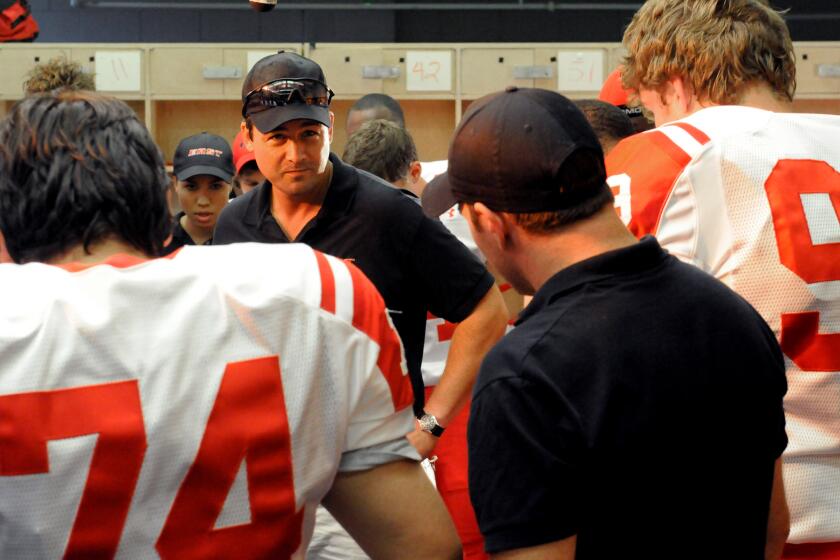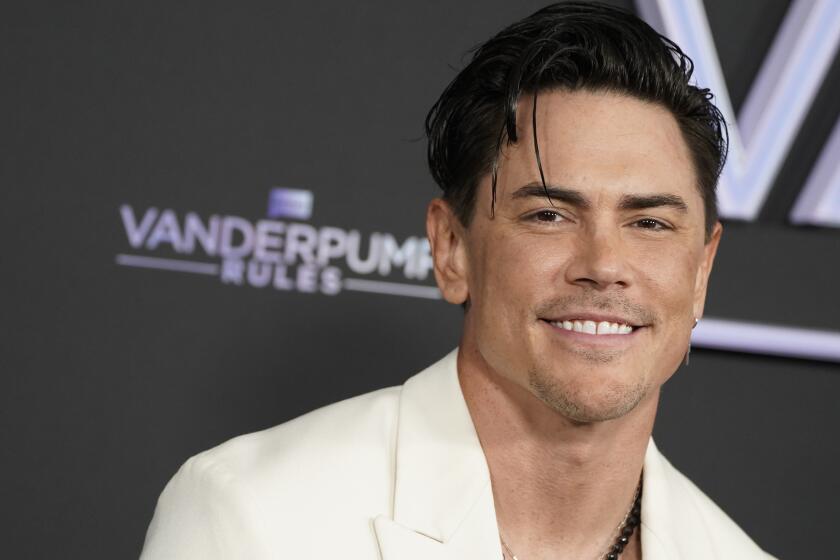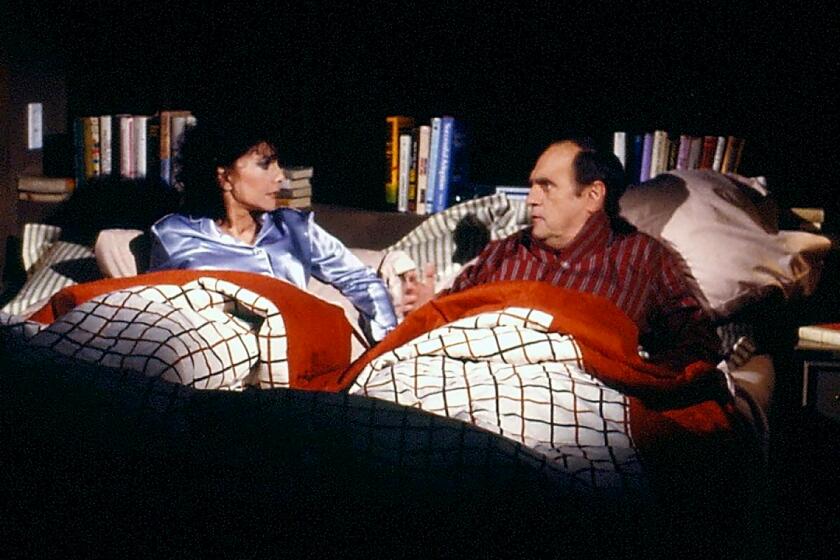How Netflix reality competition ‘The Challenge’ compares to original ‘Squid Game’
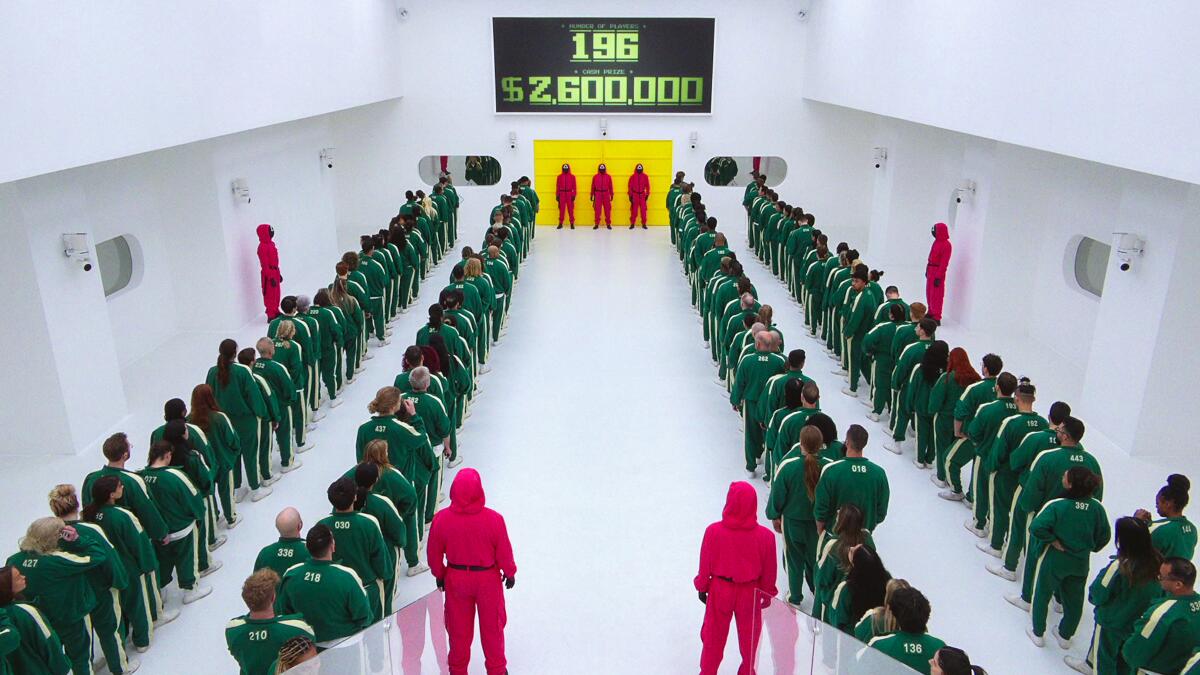
Welcome to Screen Gab, the newsletter for everyone curious whether Netflix can capture the zeitgeist with “Squid Game” again.
That’s because the streamer’s reality competition spinoff “Squid Game: The Challenge” premieres Wednesday. Staff writer Michael Ordoña offers a spoiler-free comparison with the original in this week’s Break Down.
Plus, Screen Gab No. 108 features a distinctly food-forward survey of the current TV landscape as we head into the United States’ most food-centric holiday, with items on “Chefs,” “Julia” and “Lessons in Chemistry.”
You are reading Screen Gab newsletter
Sign up to get recommendations for the TV shows and streaming movies you can’t miss, plus exclusive interviews with the talent behind your favorite titles, in your inbox every Friday
You may occasionally receive promotional content from the Los Angeles Times.
ICYMI
Must-read stories you might have missed
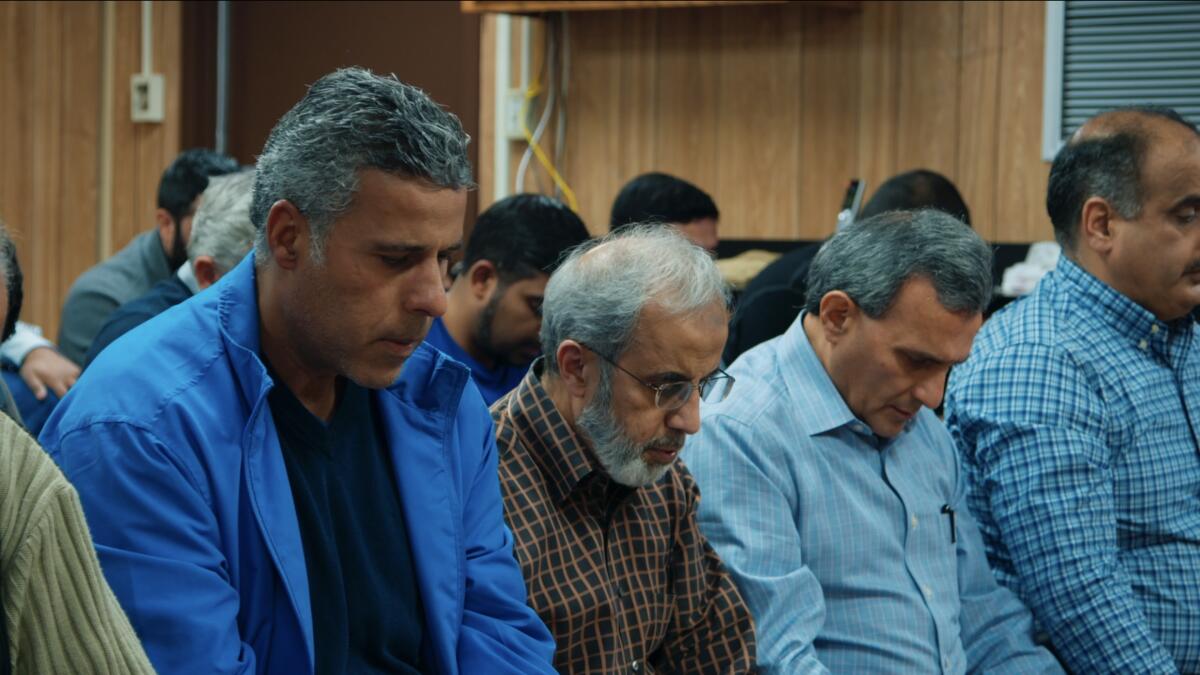
‘A Town Called Victoria’ shows how 2017 mosque arson rocked tight-knit Texas community: “A Town Called Victoria,” a PBS docuseries that premiered Monday, follows the aftermath of a fire at a South Texas mosque and demonstrates how divisive politics have frayed American communities.
The ASKN ladies from ‘The Golden Bachelor’ talk love, loss and going topless in St. Maarten: The women known as “ASKN” talk about the friendship they formed while looking for love on “The Golden Bachelor.”
As ‘The Crown’ nears its conclusion, Princess Diana’s death and its controversies are revisited: The first part of Season 6 of Netflix’s drama examines Princess Diana’s final weeks from her perspective and the media frenzy that ensued after her death.
How the JFK assassination changed TV news and the journalists who covered it 60 years ago: Coverage of the Kennedy assassination 60 years ago changed the course of TV news and shaped the careers of some of America’s best known journalists.
Turn on
Recommendations from the film and TV experts at The Times
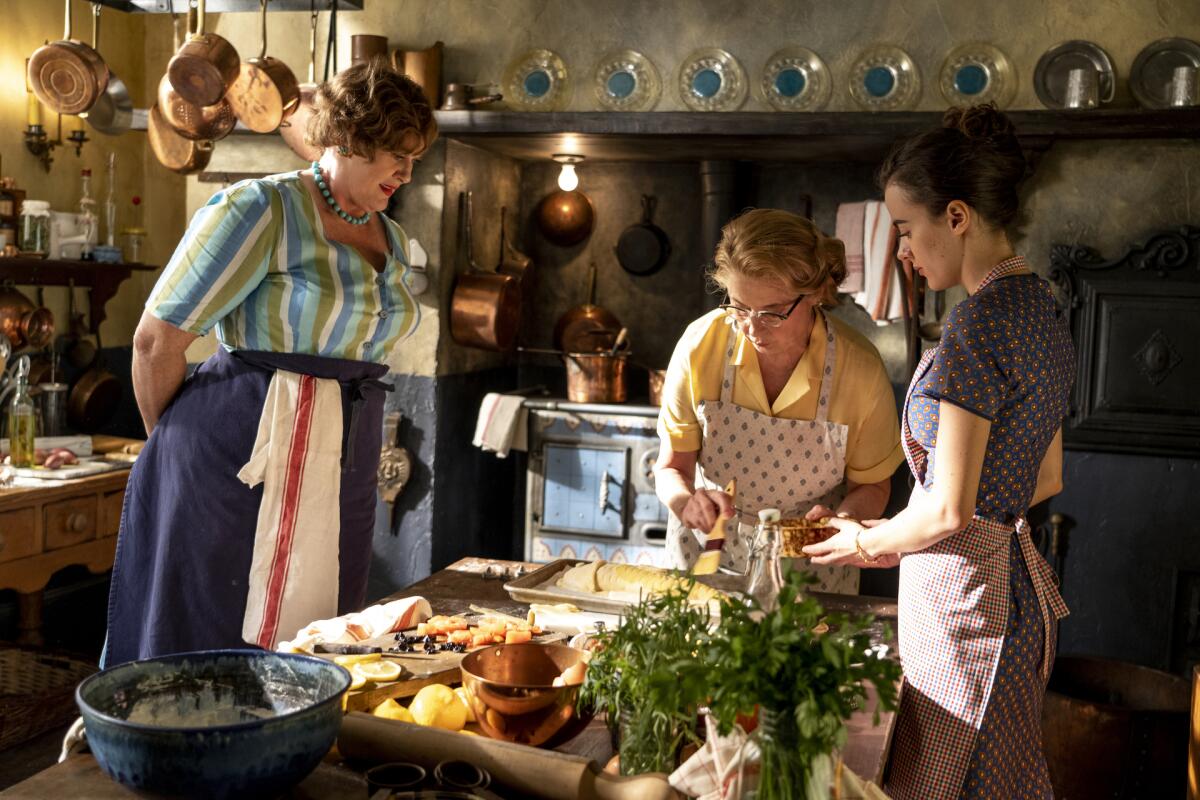
“Julia” (Max)
Thanksgiving’s approach always sends me in the direction of food in all its forms, perhaps most especially when I’m not playing host: With the pressure off, I relish thumbing through my cookbook collection, firing up old episodes of “The Barefoot Contessa,” tempting myself with my favorite restaurants’ holiday menus. It’s in this spirit that I recommend the return of “Julia,” Max’s otherwise much-diminished dramedy about Julia Child (Sarah Lancashire, undiminished in the slightest) in the age of “The French Chef.” Where Season 1 ably populated the world of public television that birthed the groundbreaking program, Season 2 — focused on Child’s fear of success, now that she’s achieved it — nearly loses sight of the fact that there was ever a cooking show at all, dashing hither and yon to keep up with the lonely widows, jealous collaborators, ambitious producers and put-upon editors in the celebrity chef’s orbit. What remains, though, is still delectable to those of us forever eager to sate a craving instead of holding it off. There are beautiful, flirtatious, multilingual men; breathtaking locales; scintillating sex; and, of course, sumptuous meals. It wouldn’t be the first time I forgave a series’ flaws to bask in the good life it depicts. Especially at this time of year, the pleasure principle holds true, even when it’s stretched as thin as the pastry around a loup en croûte. — Matt Brennan
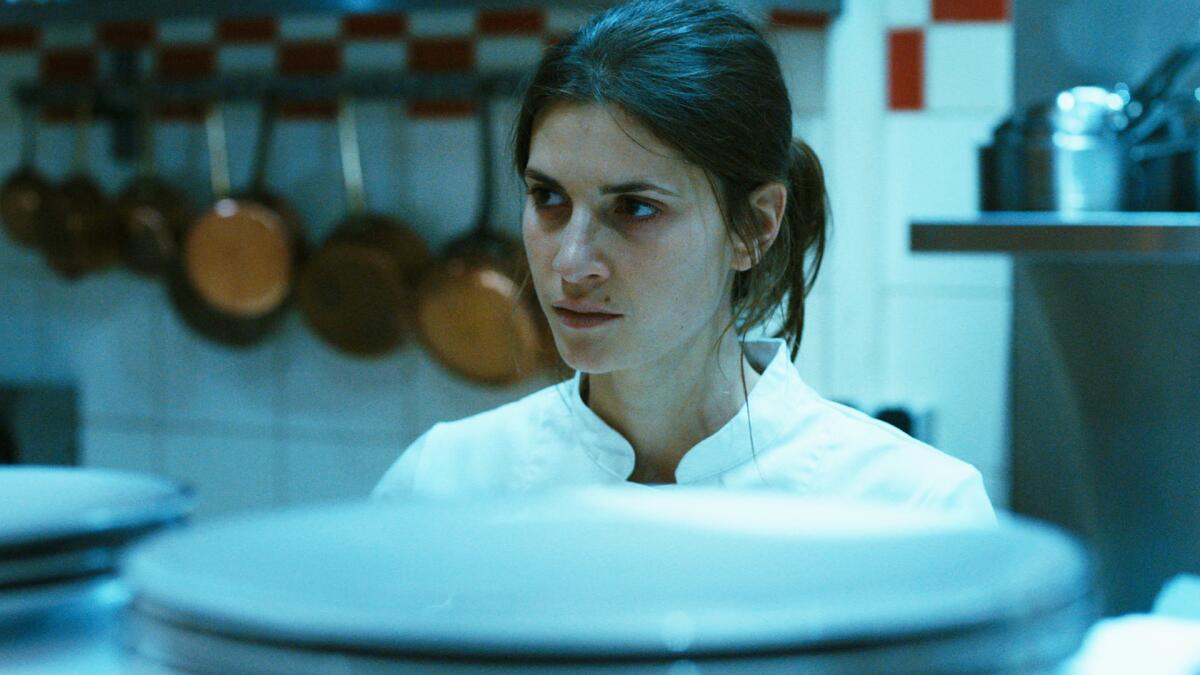
“Chefs” (MHz Choice)
Paris, a restaurant, la langue française — need I say more? “Chefs,” from 2015, is a naturalistic melodrama about a chef, called only Le Chef (Clovis Cornillac), the brilliance of whose cuisine is not reflected in the daily receipts, which leads him to make some dangerous decisions. The series, which has more on its plate than your average high-end cafe entree, is rich with Dickensian coincidence — or what seems like coincidence — and juicy yet delicately played plotlines. There is a romance, between Romain (Hugo Becker), a thief who winds up working at the restaurant as a condition of his parole, and Charlène (Joyce Bibring), a single mother popping pills to keep going; there is a villainous rival (Nicolas Gob as Yann). There are new partners all up in the chef’s business. The dishes are crafted by David Toutain, of the Michelin-starred Paris restaurant David Toutain, and they do look good. — Robert Lloyd
Guest spot
A weekly chat with actors, writers, directors and more about what they’re working on — and what they’re watching
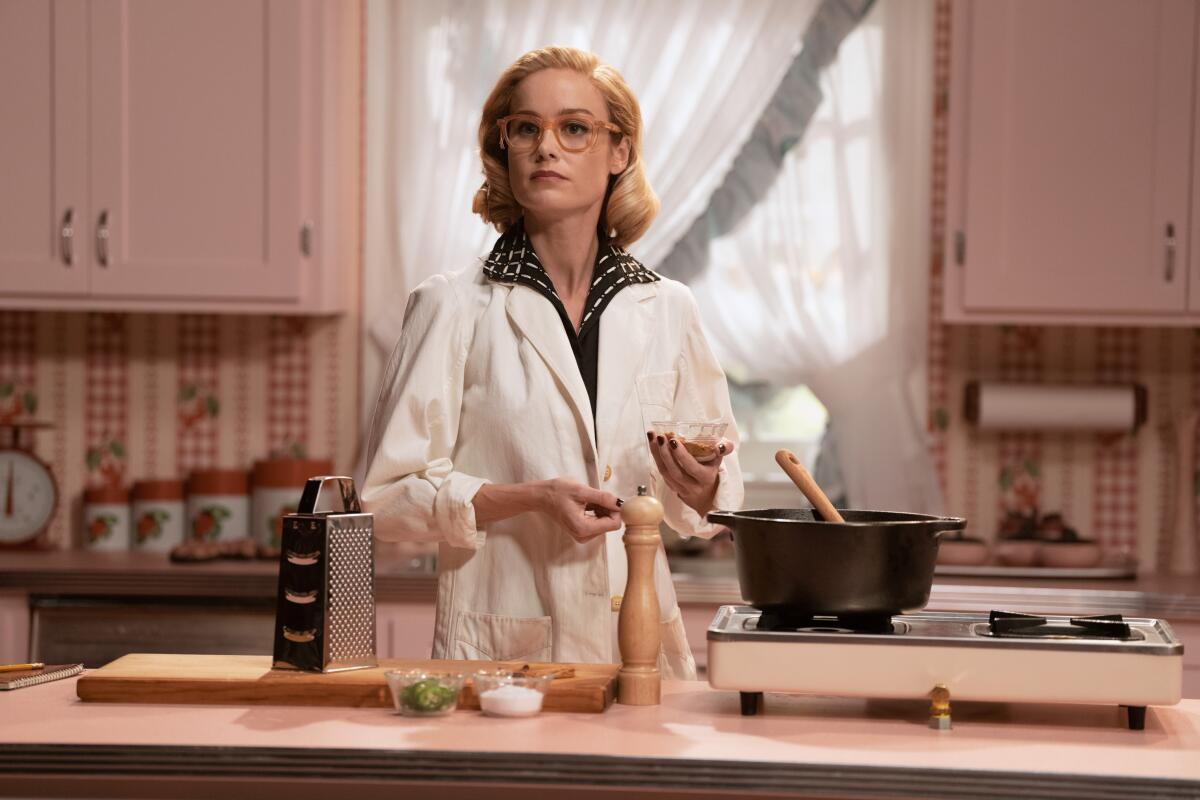
Sticking to our unofficial food theme isn’t any trouble for this week’s guest, chef, cookbook author and “Lessons in Chemistry” consultant Courtney McBroom. In the Apple TV+ series, adapted from the novel by Bonnie Garmus, Brie Larson plays Elizabeth Zott, a brilliant scientist who is thwarted by the sexism of 1950s America — and turns instead to a cooking show, “Supper at 6.” But it’s not just Larson and co-stars Lewis Pullman and Aja Naomi King who steal the spotlight. It’s also the series’ delicious dishes and faithful re-creation of the midcentury cooking show. McBroom stopped by Screen Gab recently to talk about the season’s biggest culinary triumphs, her favorite classic cooking programs and more. —Matt Brennan
What have you watched recently that you are recommending to everyone you know?
This is a little silly, but I want to answer this question honestly. A couple months ago I discovered “Beyond Belief: Fact or Fiction?” [Peacock, Prime Video, more]. Not sure how I missed it when it first came out, but boy am I glad it’s in my life now. It’s an anthology series from the 1990s hosted by Jonathan Frakes (of “Star Trek” fame). It is absolutely ridiculous and cheesy and weird and the choices they made with the reenactments are hilarious, but it’s also a little spooky. It’s right up my alley and I haven’t shut up about it since I discovered it. I’m also stoked for the new season of “For All Mankind” [Apple TV+]. I love that show.
What is your go-to “comfort watch,” the movie or TV show you go back to again and again?
I’m a native Texan through and through, so I find myself turning to “King of the Hill” [Hulu] often. It’s like going home for 22 minutes. People ask me what it was like growing up in a small town in Texas and I always tell them to watch “King of the Hill” — it’s exactly like that. There’s an episode (Season 3, Episode 19) where they totally razz my hometown of Wichita Falls the whole time. It’s so funny. Needless to say, I’m stoked for the reboot! I also love “Terminator 2: Judgment Day” [Paramount+, Fubo TV] with all of my heart. I’ve seen it countless times. Best movie ever made, as far as I’m concerned. And, with the holidays coming up, I would be remiss not to mention the greatest Christmas film ever made, which is “Die Hard” [Hulu, Tubi, MGM+].
What’s the most memorable dish reproduced in “Lessons in Chemistry,” from your point of view as a food consultant? What made it distinctive?
My favorite food from “Lessons in Chemistry” is the montage in Episode 5 when Elizabeth really gets going at “Supper at 6.” There’s a gorgeous crown roast of lamb in that segment that I’m really proud of. We just released that recipe via Food & Wine, if you want to make it! There’s also a bananas foster flambé in that segment, which was so stressful to shoot, because working with live fire on set can be tense. Of course Brie nailed it in one take because she’s the greatest. Everyone on set cheered when [director] Millicent [Shelton] yelled cut. I was so proud! You can get that recipe too, via lessonsinchemstryrecipes.com. I’m also posting all of them on my Instagram page.
For many of us, myself included, watching food TV is a particular pleasure — Ina Garten FTW! As a professional, what food TV show past or present do you enjoy watching and why?
To be completely honest, I don’t often watch modern cooking shows these days. It’s like they hit too close to home. They give me anxiety! But I love all the old-school cooking shows from the 1970s and 1980s — [BBC presenter] Keith Floyd, where he just gets blasted on booze the whole time. Martin Yan’s knife skills on “Yan Can Cook” [KQED] are legendary! Graham Kerr’s “The Galloping Gourmet” [Fubo TV], Fanny Cradock, Julia Child [PBS]. They don’t make them like they used to!
Break down
Times staffers chew on the pop culture of the moment — love it, hate it or somewhere in between
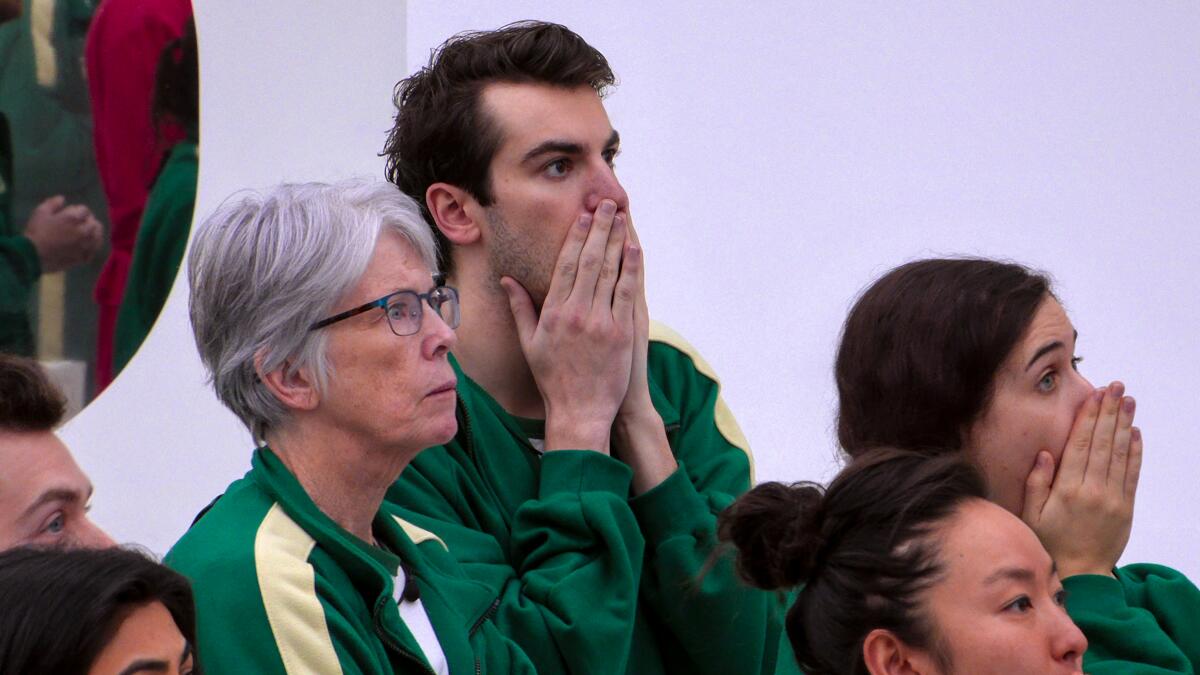
“Squid Game: The Challenge,” premiering Wednesday on Netflix, is the reality competition show based on the smash thriller series from South Korea, but it differs in key ways that distance it considerably from the original. And not just because contestants don’t actually die. At times, it’s a study in humanity that might make you want to change your major. Here are five ways the new show is close to the original … and not so close. —Michael Ordoña
Casting. Like the original, “The Challenge” tries to represent people from all walks of life. The contestant pool isn’t packed with models, geniuses and athletes; it feels like regular folks. You can’t be sure who’s good at anything, which is a plus. The flip side is some aren’t exactly big personalities, so the wizards behind the production curtain work overtime to conjure character narratives.
The look. The production design is right on; at times, you do feel you’re watching another batch of contestants going through the drama’s gauntlet thanks to the familiar visual cues.
The games. The Korean kids’ games from the original anchor viewers: You know what’s coming when that giant doll turns its head during “Red Light, Green Light.” (That also leads to a certain amount of predictability.) In relatively rare cases, “The Challenge” departs from the original’s games, but it misses an opportunity to get playful about American schoolyard favorites. I’m through the season’s first half, and I’m still waiting for something like a scary twist on hopscotch with elevated squares, where a miss leads competitors to fall to their “deaths.”
Competition reveals character. One way in which “The Challenge” closely follows the original is the stress-fueled, freak-out moments that drive the paranoia factor through the roof. When players make the mistake of showing courage, playing fair or trying to help others, they can get punished by the amygdala-dominant group mind. People change on a dime with the tiniest bit of power. There’s lying and bullying. And though it’s ugly and off-putting, it’s also true to the original’s “kill or be killed” mentality. Plus, it allows villains to emerge.
Randomness. This is where the competition series departs most from the scripted drama. In the original, contestants always had chances to avoid elimination. Here, luck and other factors beyond the contestants’ control can lead to their departure. The result is an atmosphere of existential terror — not as acute as in fiction, perhaps, given that participants know they’re not going to be shot — but with lower competitive stakes.
The complete guide to home viewing
Get Screen Gab for everything about the TV shows and streaming movies everyone’s talking about.
You may occasionally receive promotional content from the Los Angeles Times.
